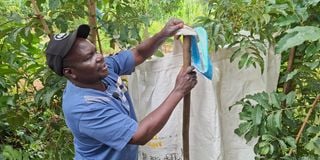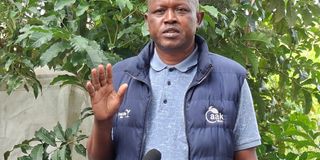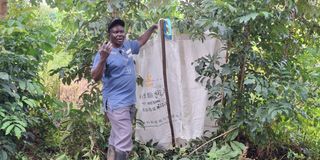The clean farming methods used by Nakuru farmers to increase maize yields

Henry Ogalo is a farmer in Salgaa, Nakuru.
On Henry Ogalo’s three-acre farm in Salgaa,, rows of robust maize stand tall, almost ready for harvest. In contrast, his neighbours’ fields beyond the fence tell a different story, with pale leaves and worrying signs of nutrient deficiency.
Ogalo believes that the difference lies in the details.
“I use minimum tillage and conservation agriculture, as well as integrated pest management. Most importantly, I take a responsible approach to pesticide use, which several farmers dismiss,” he explains.

Some of the empty pesticide containers collected at the pesticide container collection at Henry Ogalo's farm at Salgaa.
As part of the country’s food basket, Nakuru has faced growing scrutiny in recent years over pesticide misuse, especially the over-application of chemicals that leave residues in food or pollute water sources.
However, Ogalo is at the forefront of helping farmers to quietly reverse this trend.
In a region where pesticide use has long been a public health and environmental concern, his farm has become a centre of excellence and a beacon of good agricultural practice.
One of the farm's standout features is its pesticide waste management.
"Through lessons from different stakeholders on waste management, we have ensured that, as a community, all empty pesticide containers are triple-rinsed, punctured and safely returned through designated collection channels, which are located here on my farm. These bottles should never be reused in homes or left lying around. They can poison people or animals and must be treated as toxic waste,” he says.

Joel Mutai, the AAK GROW Manager for Regulatory Policy and Standards during an interview on July 10, 2025 at Salgaa.
Although this is only a short-term solution, Joel Mutai, the AAK GROW Manager for Regulatory Policy and Standards, says that they have a pesticide container collection programme in place, whereby empty pesticide containers are accumulated and disposed of according to specific guidelines.
'We want to move beyond community-level collection. Under the EPR rules, pesticide companies will now be required to take back used containers, either individually or collectively. The goal is to collect and transport them for either recycling or safe destruction. We’re working to set up more collection centres across counties and introduce recycling where possible," Mr Mutai says.
Ogalo also employs integrated pest management (IPM) practices and has set up blue and yellow traps across his farm. He notes that these traps are simple yet effective tools for monitoring insect activity.
“Before I spray anything, I check the traps to see which pests are present and how serious the infestation is,” he explains. “That helps me decide if it’s time to act and what level of

Henry Ogalo explains how the pesticide container collection concept works at his farm in Salgaa on July 10, 2025.
infestation will prompt the type of pesticide application.”
“If I have to spray, I use the right dosage, only where needed, and I suit up,” says Ogalo, pointing to his spraying gear, complete with gloves, mask, boots, and overalls. He adds that a key message he preaches to other farmers is that chemicals should be a last resort.
He strictly observes the pre-harvest interval (PHI) for each pesticide, ensuring that no chemical residue finds its way into his family’s food or onto consumers’ plates.
"If the label says wait 14 days before harvest, I wait 14 days. No shortcuts," Ogalo says.
Five years ago, he says, he could barely make ends meet, harvesting just 18 90-kilogram bags of maize per acre. But his efforts have since paid off. He now harvests between 38 and 42 bags per acre and sells his maize daily at Sh600.
His careful approach hasn’t gone unnoticed, and other farmers are referred to his farm to learn how sustainable farming and productivity can go hand in hand.
With growing concerns about food safety locally and internationally, Ogalo believes that more farmers must learn to balance yield goals with health and environmental safety.
“Farming isn’t just about what we harvest; it’s also about protecting the soil, the water and the people who eat our produce,” he says.


